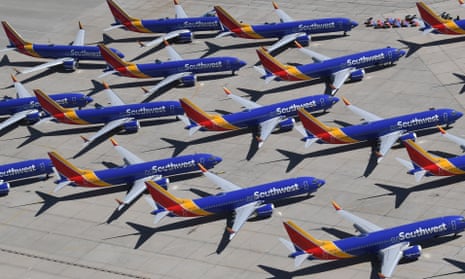America First nationalism, indulgent free market economics, Republican libertarianism and a political system in hock to corporate lobbying has just contributed to killing 356 innocent people. The more we know about the crashes of Boeing 737 Max 8 planes in Indonesia and Ethiopia – after anti-stalling devices locked both aircraft into unrecoverable nose-dives – the more shocking the story becomes.
It is not just Boeing, a once magnificent company, that is being condemned – it is the US’s wider economic, political and regulatory structures. What is not required is a short-term software fix on the faulty MCAS system that automatically adjusts the plane’s flight trajectory, along with an improved safety manual and training for pilots, which is Boeing’s response so far. What is needed is a root-and-branch overhaul of the intersection between capitalism and democracy in the US. The current set-up – and the accompanying libertarian, anti-state, anti-regulation philosophy – literally kills people.
The story begins in 2011. Europe’s new Airbus 320neo, with its superb fuel efficiency and low operating costs, had picked up 667 orders at the Paris air show, a record for a commercial aircraft. Worse, American Airlines had done the unthinkable: it had ordered 130 of the new Airbus and 130 of the older one. Boeing’s relationship with American was foundational: it could always rely on the airline for its bedrock business, an insider, all-American affair. Now American had dared to buy European in unprecedented volumes: it was a competitive necessity to match rival airlines. Boeing had to respond. But instead of developing a whole new plane that could carry heavier, fuel-efficient engines, it made the fateful decision to bolt them on to a variant of its 737 series. Since the days of Orville and Wilbur Wright, the key to safe flying has been to organise the pitch of the plane so that its aerodynamics work to prevent stalling, a complex interrelationship between the angle and shape of wings, the distribution of weight and the power of the engines. If you intend to use a heavier, more fuel-efficient engine, it will throw everything out of kilter. Essentially, you have to design a new plane.
Boeing’s initial and correct reaction had been to commit to just that, but the process is enormously expensive and takes up to 10 years. The company had to react faster and keep its share price up, so the Max 8 was born, going into service in 2017. The technical problem was obvious. With heavier engines, the pitch of a plane with wholly different dynamics could be disturbed in some flying conditions. Hence the sensor in the front of the plane that would recognise changes in pitch and automatically adjust the wings to keep the plane stable, not in principle a bad idea, but one that requires hyper-reliability and a way for pilots to override the system when necessary.
In the world of aerospace, such judgment calls should have required an entire recertification process and verification by a third party. That did not happen. For decades, regulation in the US has been hamstrung by the libertarian charge that government is inefficient and always wrong, taxes are a coercive infringement of individual liberty, and regulation inhibits private sector dynamism. The Federal Aviation Authority has an enviable technical reputation, but over the past decade it has suffered from successive budget cuts and government shutdowns as the Republican party has waged war on federal spending and federal agencies. Donald Trump, before the crashes, said he wanted to privatise the agency and scale it back even more.
In order to function at all, the FAA has had to delegate regulation to airlines and manufacturers – the fox looking after the chicken coop. Essentially, Boeing decided that the Max 8 did not need recertification and this decision was not challenged by the FAA. Moreover, Boeing undertook much of the safety work itself without any independent review, although as yet the outside world does not know to what degree. What we do know is that 1,000 Boeing employees are seconded to the FAA. Boeing then decided to market the Max 8 as part of the 737 family rather than as a plane with wholly different flight characteristics and a new automated software system that, crucially, did not allow pilots to override in an emergency using standard, practised techniques. Instead, they would need special training, which was not offered or provided.
When the first crash happened, Boeing did not ground all Max 8s; the FAA also failed to act. American prestige was at stake, along with Boeing’s commercial interests. Tellingly, after the second crash, the US was the last to ground the aircraft. But then Boeing is one of the US’s top 10 corporate lobbyists, contributing to Democrats and Republicans alike: juicy defence contracts, government backing for trade fights with Airbus and organising benign regulation costs money. But on safety it has backfired spectacularly.
Boeing is now enveloped in an existential crisis. The libertarian thinking the company exploited has caused a collapse in its reputation and reinforced a long-overdue reaction to the excesses of corporate America. In my Radio 4 documentary, Goliath, I report on the growing intellectual and political revolt against the US right’s attempt to muzzle US policy on challenging monopolies. No, the market will not automatically correct them, the doctrine that has held sway since the 1980s. Companies as disparate as Amazon, Boeing and Facebook need challengers, constraints on their power and tough independent regulators.
The conventional wisdom is that Trump’s re-election may be hard to stop. But it neglects growing alarm in the US about abuses of corporate power. The refrain is: “Let Donald Trump and his transport secretary, Elaine Chao (whose chief qualification for office is that she is the partner of the Republican leader of the Senate, Mitch McConnell), go on the first 300 test flights when the Max 8 goes back into service.” Leading British Brexiters, so in love with all things American and distrustful of anything European, can fly with them. Until the US system changes, the rest of us may choose Airbuses.

